Combination of Resistors - Series and Parallel Combination
Combination of Resistors - Series and Parallel Combination: Overview
This topic covers concepts, such as, Parallel Combination of Resistors, Series Combination of Resistors, Power Distribution in Parallel Combination of Resistors & Power Consumed in a Parallel Combination of Resistors etc.
Important Questions on Combination of Resistors - Series and Parallel Combination
A wire of resistance is gradually stretched to double its original length. It is then cut into two equal parts. These parts are then connected in parallel across a 4.0 volt battery. The current drawn from the battery is:
A (i) series (ii) parallel combination of two given resistors is connected, one – by – one, across a cell. In which will the terminal potential difference, across the cell, have a higher value?
(i) Calculate the equivalent resistance of the given electrical network between points and .
(ii) Also calculate the current through , if a source is connected between and , and the value of is assumed as .
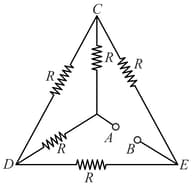
You are given resistors, each of resistance . These are first connected to get the minimum possible resistance. In the second case, these are again connected differently to get maximum possible resistance. The ratio between the minimum and maximum values of resistance so obtained is
You are given ‘n’ resistors, each of resistance ‘r’. These are first connected to get minimum possible resistance. In the second case, these are again connected differently to get maximum possible resistance. The ratio between the minimum and maximum values of resistance so obtained is
Find the equivalent resistance between point and
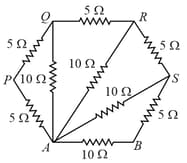
What will be the most suitable combination of three resistors so that is equivalent resistance of combination?
For the circuit given below, what is the effective resistance between points and

If of resistance is made by adding four resistance of tolerance then the tolerance of the combination in the percentage is.
The figure shows a network in which the cell is ideal and it has an emf . The potential difference across the resistance is
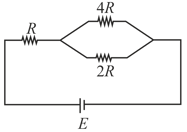
In the given circuit all resistance are of value of ohm each. The equivalent resistance between and is:
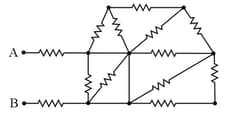
The figure shows three circuits and which are connected to a battery. If the powers dissipated by the configurations and are and respectively, then -

The equivalent resistance between and for the given circuit is ohm where, . Value of is,

In the figure shown, segments and , as well as the diagonal segments and have a resistance each. The mid points of the diagonal wires are soldered with each other. If the effective resistance between the mid points of sides and is , find the value of .
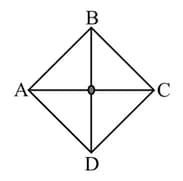
Resistance of each part is and resistance of circumference is negligible as shown in figure. The equivalent resistance across is Fill the value of
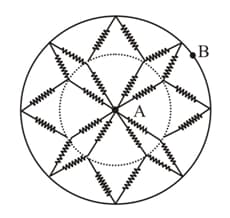
Four infinite ladder alike networks are combined as shown in figure .Each resistance is . The equivalent resistance between and is and between and is Let ratio then find the value of .
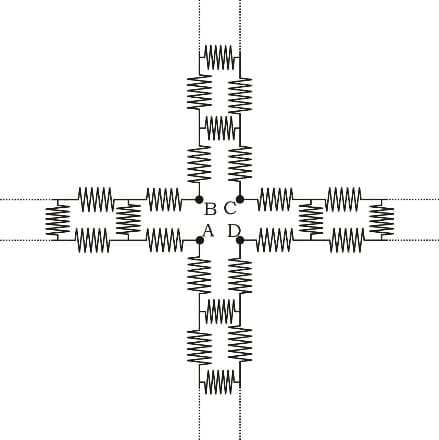
A wire has a resistance of is bent in the following shape. The effective resistance between and is . The value of is

A wire having resistance is bent into a circle. The resistance between the two diametrically opposite points is . Then is:
Five resistance are connected as shown in the figure. The equivalent resistance between and is (in ):-

Two wires of the same dimension but resistivity , and are connected in series. The equivalent resistivity of the combination is
